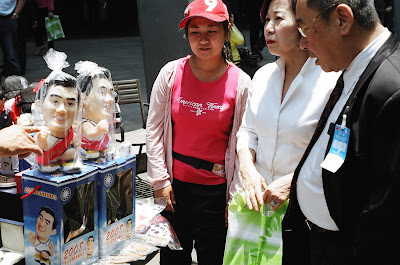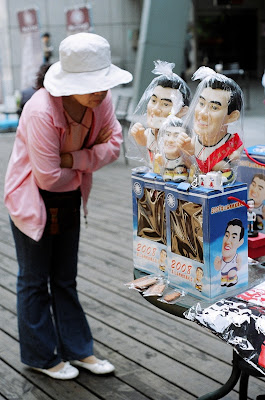
The Christian Science Monitor, May 21, 2008
TAIPEI, TAIWAN - The China-friendly Ma Ying-jeou was inaugurated Tuesday as Taiwan's president amid high hopes for a new era of cross-strait cooperation.
It was Taiwan's second democratic transfer of power, after eight years of rule by the pro-independence party. Those years were marked by cross-strait tension, domestic gridlock, and lackluster economic performance.
In a closely watched inaugural address, Ma cited the two sides' common Chinese heritage. That was a noticeable change from his predecessor Chen Shui-bian, who trumpeted the island's distinct identity.
Ma repeated his intent to improve cross-strait ties based on the "1992 consensus." That formula sees both sides recognizing the idea of one China, agreeing to disagree on what exactly that means.
"It's a good beginning," said Tao Wenzhao, at the Chinese Academy of Social Sciences in Beijing. "There's commonality between Ma Ying-jeou and our position ... this will be positively received in the mainland."
Ma, who belongs to the Kuomintang, or Chinese Nationalist Party, has raised expectations with promises of closer economic ties, a resumption of talks frozen since 1999, and a possible peace deal.
China refused to deal with Ma's pro-independence predecessor. But since Ma's victory on March 22, China has signaled willingness to "shelve differences" and restart dialogue. That's fueled hopes of a détente.

Inauguration excitement was palpable in Taipei Tuesday. Vendors hawked Ma figurines, baseball hats, and commemorative stamps outside the arena where a concert and his address took place.
As he watched a performance by rocker Wu Bai – Taiwan's answer to Bruce Springsteen – on a giant screen outside the arena, Cheng Yi-yin explained why he skipped work to join the celebration.
"I love Ma Ying-jeou," said Mr. Cheng, holding Taiwan's national flag. "He'll help Taiwan. The KMT wants the status quo – no independence and no unification. I think that's better for the Taiwanese people, because nobody likes war."

Most analysts agree that Ma should be able to expand cross-strait economic links. But some say he may have raised expectations on political progress too high.
The economic agenda includes expanding direct flights and shipping links, allowing more Chinese tourists into Taiwan, and relaxing limits on investment.
Ma also wants to end the diplomatic battle for allies, discuss expanding Taiwan's participation in international groups like the World Health Organization, and formally end decades of hostilities.
On such issues, the extent of China's goodwill remains unclear. "The ball is in Beijing's court," says Lo Chih-cheng, a political scientist at Soochow University in Taipei. "Economic links can be resolved on the basis of the '92 consensus, but when it comes to issues of international space and a peace accord, I'm not sure if that will be good enough for Beijing."

Ma also risks a backlash at home if he's seen as too cozy with China. The pro-independence party rejects the 1992 consensus as a dangerous downgrade of sovereignty. And many party members fear that economic integration could give Beijing too much leverage over the island.
Ma has ruled out unification in his term. In his address, he emphasized Taiwan's democratic achievements and held up the island as a political model for China.
Since a landmark visit by a top KMT official to China in 2005, Ma's party has forged a detailed consensus with Beijing on economic and cultural exchanges. Ma's challenge now is to expand that consensus to his political opponents in Taiwan.
That process could slow economic integration and nix riskier political overtures by Ma. "In two or three years, many people in Taiwan may say, 'Maybe we've gone too far, too fast,' " says Joseph Cheng, a political analyst at City University of Hong Kong. "So he'll have to move carefully."

For now, many Taiwanese are focused on economic issues. "We're an independent country now," said Cheng Yi-yin. "With Ma, cross-strait economics should improve fast. But for politics, it may take 100 or 200 years to resolve this problem."
He pointed skyward and smiled. "I think the stock market will go up, too."
Original site














 Now, the lake area is set to see even more tourists, an influx that could further relegate the Thao to a cultural sideshow. Taiwan's new, more China-friendly government has promised a deal by early July to allow more visits by mainland tourists, for whom Sun Moon Lake is high on the "must-see" list.
Now, the lake area is set to see even more tourists, an influx that could further relegate the Thao to a cultural sideshow. Taiwan's new, more China-friendly government has promised a deal by early July to allow more visits by mainland tourists, for whom Sun Moon Lake is high on the "must-see" list. 
 (photos by George Tsorng and Jonathan Adams)
(photos by George Tsorng and Jonathan Adams)






